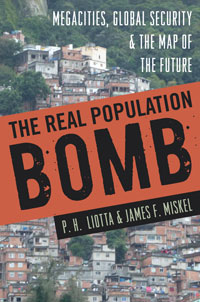From 1950 to 2015, as projected by the United Nations, the population of Lagos will rise from 1 million to 25 million; Dhaka, from 400,000 to 22.8 million; and Kinshasa, from 200,000 to 10.5 million. These are among the places the authors of the new book The Real Population Bomb describe as “Category 5 Megacities.”
In a riff on Paul Ehrlich’s 1968 classic, Peter Liotta and James Fiskel argue that exponential urban growth is a danger to human survival. The problem, however, is not simple overpopulation but massive suffering and chaos in places where corruption and poverty reign.
Fiskel is a former director of defense policy at the National Security Council; Liotta, a visiting professor at West Point, is a former Air Force pilot. Still, they are something of an odd couple. As Liotta says, “I’m a Marxist poet; James is a hard-core Republican.”
The authors agree, though, that strong international action is needed, and that includes intervention from the United Nations or the U.S. military. The authors say that further consideration should be paid to economist Paul Romer’s controversial idea of “charter cities,” in which a foreign body like the U.N. or even a university would take temporary control of governance in a failed city.
Question: The book opens with a George Orwell epigram: “This squalid brawl in a distant city is more important than might appear at first sight.” Is your message that Americans should be afraid of the Third World megacity?
Peter Liotta: Before you can be afraid, you should at least be aware. We may not want to be involved in these places, but we don’t have a choice.
Your book covers seven cities on three continents. Which do you think requires most urgent attention?
They’re all important in different ways. Dhaka is ecologically vulnerable. Gaza, we call it a mini-megacity — it’s an example of a city in which the government has completely fallen apart. Karachi is basically run by the military or terrorist organizations that go there for R&R.
The common theme is that [the world, in terms of mass population of these megacities, has] never been here before. We argue about whether it’s an Asian or an American century, but that’s irrelevant. This is a megacity century.
In the United States, we have over 8 million children living in high poverty areas. How can you sell the argument that we should take responsibility for everyday poverty in countries like Kenya or Bangladesh?

Look, you’re not going to win this argument by talking about the good of humanity. It’s about our own survival. These massive urban agglomerations are breeding grounds for disease. They are safe havens for terrorism. There is no barrier between the so-called developed and developing worlds anymore. What happens there affects us here.
You teach cadets at West Point. How do megacities fit into their future role in the U.S. military?
My students at West Point are exceptional, and I’m glad they’re going into the military. We need smart people. They’re way ahead of the current policy community in terms of understanding the importance of human security. I tell my students, what you have to be prepared for is urban warfare. When one of these cities does collapse, it’s going to be nothing like a traditional battlefield. Our first real taste of that was Mogadishu.
Most of the policy approaches you discuss, like supporting anti-corruption programs and regional development agencies, are fairly straightforward. Then there’s the charter city idea.
Is the charter city a new form of colonialism and imperialism? Absolutely. But if it works, why not try it? I just finished re-reading Late Victorian Holocausts, which talks about how the British Empire manipulated and raped two great empires, India and China. So, I acknowledge that the precedents are not good. But that’s not what the charter city is about. I’m not here to take from you — I’m here to help you get on your feet.
In New York City, Mayor Bloomberg’s takeover of the public school system causes uproar. Do you think a national government would voluntarily let a foreign power take control of a major city within its borders?
You cannot have a completely democratic system to implement this idea. I know it sounds horrible, but it’s true. You would need to have some kind of agreement in place with the national government, otherwise it’s just an occupation force.
Paul Romer [the main proponent of charter cities] spoke recently at a senior leadership conference at West Point. The idea raised a lot of excitement among the military people. My military colleagues would probably kill me for saying that. We’re so overstretched right now.
Maybe you’d start with a smaller urban area and work your way up to a megacity.
Yes. Starting on a large scale, isn’t that what we tried to do in Baghdad? That didn’t work out so well.




